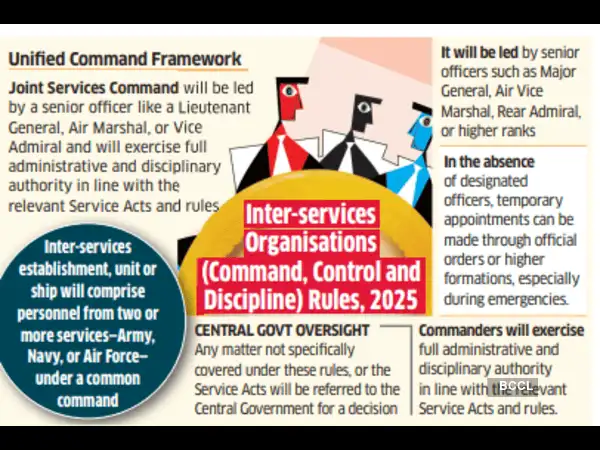Syllabus: GS3/ Defence
In News
- The Ministry of Defence recently notified the Inter-Services Organisations (Command, Control & Discipline) Rules, 2025, under the Inter-Services Organisations (ISO) Act, 2023.
Background
- The ISO Act, 2023 was enacted to enable smoother functioning of joint defence structures like Joint Commands and Inter-Service Establishments.
- The newly notified rules, effective from May 27, 2025, operationalise the Act by specifying how command and disciplinary powers will be exercised within Inter-Service Organisations.
Objectives of the Rules
- Enhance Unified Command: Ensure smooth command and control within Joint Services Commands.
- Faster Disciplinary Action: Enable quick disposal of cases and avoid procedural duplication.
- Strengthen Jointness: Build interoperability between the Army, Navy, and Air Force through legal and administrative cohesion.
ISO Act, 2023 – Structural Provisions
- Constitution of ISOs: The Central Government is empowered to create ISOs like Joint Commands, composed of personnel from at least two services.
- Superintendence: Overall authority remains with the Central Government, which can issue directions in national security or public interest.
- Commanding Officer (CO): The Act provides for a CO to lead any unit, ship, or establishment within an ISO framework.
Key Provisions of the ISO Rules, 2025
- Empowerment of Commanders: The Commander-in-Chief (CiC) of a Joint Services Command (JSC), the Officer-in-Command (OiC) of Inter-Service Establishments, and the Commanding Officer (CO) of Inter-Services Units will have full disciplinary and administrative powers over all personnel posted or attached, regardless of their parent service.
- Retention of Service Acts: While authority is delegated, the original service rules (Army Act, Navy Act, Air Force Act) still apply to individuals, maintaining service-specific identities.
- Residuary Powers: Any matter not explicitly covered under these rules or the Act will be escalated to the Central Government for resolution.
- Chain of Command: If the CiC, OiC, or CO is absent or on leave, a replacement will be notified officially. In emergencies, higher formations can appoint interim officers until formal notification.

Image Courtesy: ET
Challenges in Implementation
- Service Culture Clashes: Integrating command cultures of the three forces may face resistance from within.
- Ambiguity in Dual Jurisdiction: Possibility of friction between ISO authority and parent service chain of command.
- Legal Interpretation Conflicts: Different Acts governing service personnel may complicate disciplinary matters unless harmonised.
Source: TH
Previous article
News In Short-28-05-2025
Next article
Importance of the Deputy Speaker in Lok Sabha